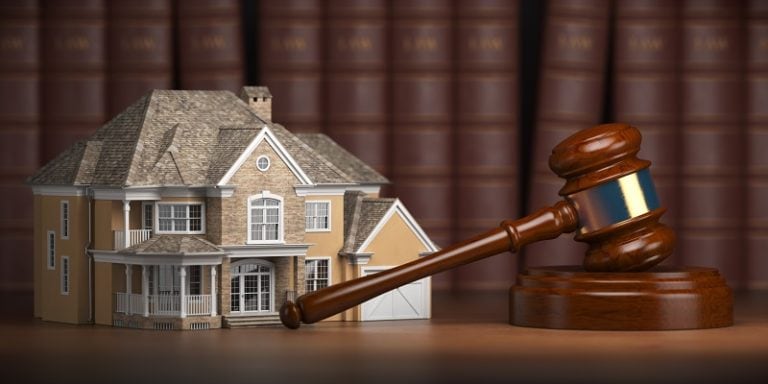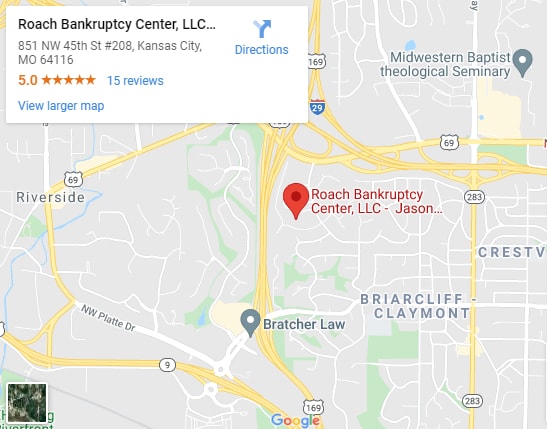Shielding Your Home From Foreclosure with Chapter 7 Bankruptcy
The prospect of home foreclosure is a daunting and stressful experience. The fear and uncertainty of possibly losing your home can seem insurmountable. But there is a way to stop this process and safeguard your financial future: It’s understanding how to stop home foreclosure through Chapter 7 bankruptcy.
This blog post will delve into the complexities of Chapter 7 bankruptcy and how it can be a strategic tool to stop home foreclosure. We aim to equip you with the necessary knowledge and insights, simplifying the complexities of bankruptcy law, and enabling you to make an informed decision.
Navigating the complexities of home foreclosure and bankruptcy law might seem overwhelming, but you’re not alone. At Roach Bankruptcy Center, LLC, we have a proven track record of guiding individuals just like you through these challenging situations with our comprehensive legal services. Ready to put a stop to home foreclosure and reclaim your financial stability? Our bankruptcy attorney at Roach Bankruptcy Center, LLC is here to help. Contact us today.
What Is Home Foreclosure?
Home foreclosure is a legal process in Missouri initiated by a lender or mortgage company when a borrower defaults on their mortgage payments. This typically happens after several months of non-payment, the specifics of which are outlined in the mortgage contract.
Most home foreclosures in Missouri follow a non-judicial process, meaning the lender can proceed without court intervention if allowed by the mortgage or deed of trust. The borrower is first served with a Notice of Default, followed by a Notice of Sale, indicating the lender’s intent to auction the property.
Missouri law sets a timeline for the foreclosure process, ensuring homeowners receive adequate notice and an opportunity to rectify their situation. For example, the Notice of Sale must be mailed at least 20 days prior to the scheduled sale and published in a local newspaper.
The foreclosure process aims to enable the lender to recover the balance of the unpaid loan. If the auction sale fails to cover the remaining debt, a deficiency judgment may be sought against the borrower, depending on the mortgage terms. It’s crucial to remember that proactive measures, including Chapter 7 bankruptcy, can potentially stop the foreclosure process.
What are the Common Causes and Warning Signs of Home Foreclosure?
Home foreclosure in Missouri, as elsewhere, typically arises from a variety of financial difficulties. Some of the most common causes include:
- Unemployment or Loss of Income: Job loss or a significant reduction in income can make it difficult for homeowners to keep up with their mortgage payments.
- Medical Expenses: Unexpected or significant medical expenses can strain a household budget, sometimes to the point where mortgage payments can no longer be made.
- Divorce: A divorce can result in a reduced income for one or both parties, making it challenging to maintain mortgage payments.
- High Levels of Debt: Homeowners carrying a large amount of debt may find it difficult to manage all of their payments, including their mortgage.
As for warning signs that a foreclosure may be impending, they include:
- Repeated Defaults: If you’ve defaulted on your mortgage payments several times, this is often a clear sign that a foreclosure may be on the horizon.
- Notice of Default: Receiving a Notice of Default from your lender is a formal warning sign that foreclosure proceedings may begin.
- Increased Communication from Lender: If your lender starts contacting you more frequently, especially regarding missed payments, it may be a warning sign.
- Notice of Sale: The Notice of Sale is a clear sign that the foreclosure process is advancing. It indicates the lender’s intent to sell your property at auction.
- Legal Notices: Receipt of legal notices related to your mortgage is a clear indication that foreclosure may be imminent.
Remember, early recognition of these signs and proactive action can help homeowners prevent foreclosure. In some cases, filing for Chapter 7 bankruptcy may be an effective strategy to halt the process.
What are the Consequences of Home Foreclosure?
Foreclosure can have serious consequences for homeowners, both financially and emotionally. These consequences may include:
- Loss of home – Foreclosure may result in the homeowner losing their property and being forced to vacate.
- Damage to credit score – Foreclosure has a severe negative impact on credit scores, making it challenging to obtain future loans or credit on favorable terms.
- Financial implications – Homeowners may still be responsible for the remaining mortgage balance if the sale of the property does not cover the full debt.
- Emotional toll – Foreclosure can lead to stress, anxiety, and a sense of loss for homeowners and their families.
Understanding the process and potential consequences of foreclosure is crucial for homeowners in order to explore available options and take proactive steps to prevent or mitigate the impact. In the next sections, we will delve into Chapter 7 bankruptcy as a potential solution to stop home foreclosure and provide a fresh financial start. Consulting a dependable bankruptcy attorney is important if you are worrying about losing your home due to foreclosure.
What is Chapter 7 Bankruptcy?
Chapter 7 bankruptcy, also known as “liquidation bankruptcy,” allows individuals to discharge or eliminate certain types of debt, providing relief from overwhelming financial obligations. The primary purpose of Chapter 7 bankruptcy is to give individuals a chance to start anew by wiping out unsecured debts, such as credit card bills, medical bills, and personal loans.
What Are The Eligibility Criteria for Filing Chapter 7?
To qualify for Chapter 7 bankruptcy, individuals must meet specific eligibility requirements, including:
- Means Test – The means test compares the individual’s income to the median income in their state. If their income falls below the median, they automatically qualify for Chapter 7. If their income exceeds the median, further calculations are performed to determine eligibility.
- Credit Counseling – Individuals must complete a credit counseling course from an approved agency within six months before filing for Chapter 7 bankruptcy.
What is an Automatic Stay and What is Its Impact on Foreclosure?
One of the significant benefits of filing for Chapter 7 bankruptcy is the automatic stay. When a bankruptcy petition is filed, an automatic stay is immediately imposed, which puts a stop to almost all collection efforts, including foreclosure proceedings. This stay provides homeowners with much-needed relief and time to evaluate their options and work towards resolving their financial difficulties.
Understanding the basics of Chapter 7 bankruptcy lays the foundation for homeowners to explore its potential benefits in stopping home foreclosure. In the following sections, we will delve deeper into how Chapter 7 bankruptcy can play a crucial role in safeguarding the home and providing a pathway towards financial stability.
What is the Role of Chapter 7 Bankruptcy in Stopping Foreclosure?
Chapter 7 bankruptcy can play a vital role in stopping foreclosure and providing homeowners with the opportunity to protect their homes. By understanding the specific mechanisms through which Chapter 7 operates, individuals can effectively utilize this legal tool to halt foreclosure proceedings and regain control over their housing situation.
Automatic Stay
Upon filing for Chapter 7 bankruptcy, an automatic stay is immediately triggered. This legally mandated stay puts an immediate halt to all collection activities, including foreclosure proceedings. The automatic stay provides homeowners with breathing space, allowing them time to evaluate their options, negotiate with lenders, and explore alternatives to foreclosure.
Temporary Relief
While the automatic stay offers temporary relief, it does not provide a permanent solution to foreclosure. However, it offers homeowners an opportunity to work with their bankruptcy attorney and explore potential strategies to address their mortgage arrears and secure their homes.
Protection of the Debtor’s Assets, Including the Home
Chapter 7 bankruptcy includes exemptions that protect certain assets from being liquidated to repay debts. Depending on the state’s exemption laws, homeowners may be able to safeguard their primary residence from being sold as part of the bankruptcy process. These exemptions vary, so consulting with a knowledgeable bankruptcy attorney is crucial to understanding the specific protections available in a particular jurisdiction.
Discharge of Certain Debts to Alleviate Financial Burden
Chapter 7 bankruptcy allows for the discharge of unsecured debts, such as credit card debt, medical bills, and personal loans. By eliminating these debts, homeowners can significantly reduce their overall financial burden, making it easier to manage their mortgage payments and potentially avoid future foreclosure risks.
How to Prepare For Chapter 7 Bankruptcy?
Before filing for Chapter 7 bankruptcy to stop home foreclosure, it’s important to thoroughly prepare and gather the necessary information and documentation. Taking the time to organize your financial records and consult with a bankruptcy attorney can help ensure a smoother and more successful bankruptcy filing process.
Here are key steps to take:
- Gather Necessary Financial Documents
Income Documentation – Collect recent pay stubs, income statements, or other proof of income for the past six months.
Tax Returns – Gather tax returns for the past two years, including all schedules and forms.
Asset Information – Compile a comprehensive list of your assets, including real estate, vehicles, bank accounts, investments, and any other valuable possessions.
Debt Documentation – Gather statements and details of all outstanding debts, including mortgage statements, credit card bills, medical bills, personal loans, and other financial obligations.
Expenses and Budget – Create a detailed record of your monthly expenses, including housing costs, utilities, transportation, groceries, and other necessary expenses.
- Consulting with a Bankruptcy Attorney
- Seek Professional Guidance – It’s highly recommended to consult with a qualified bankruptcy attorney who has extensive experience in Chapter 7 cases. They can provide personalized advice based on your specific circumstances and guide you through the bankruptcy process.
- Attorney Selection – Research and choose an attorney with extensive experience in bankruptcy law, a good reputation, and a track record of successful cases.
- Initial Consultation – Schedule an initial consultation to discuss your financial situation, evaluate your options, and determine if Chapter 7 bankruptcy is the appropriate solution for you.
- Assessing Alternatives and Implications
- Explore Alternatives – Prior to filing for Chapter 7 bankruptcy, consider alternative options such as loan modifications, debt consolidation, or negotiating with creditors. Discuss these alternatives with your bankruptcy attorney to make an informed decision.
- Long-Term Financial Implications – Understand the potential long-term consequences of filing Chapter 7 bankruptcy, including the impact on your credit score, future borrowing ability, and the potential discharge of certain debts.
By taking the time to gather essential financial documents, consulting with a bankruptcy attorney, and considering alternative options, you can better prepare for the Chapter 7 bankruptcy process. In the next section, we will delve into the necessary steps and procedures for filing Chapter 7 bankruptcy, guiding you toward stopping home foreclosure and achieving a fresh financial start.
Stop Home Foreclosure with the Help of Our Bankruptcy Lawyer!
Don’t let the fear of home foreclosure consume you. Take control of your financial future and protect your most valuable asset with the power of Chapter 7 bankruptcy. By understanding the process and taking the necessary steps, you can halt foreclosure proceedings and pave the way for a fresh start. But you don’t have to face this journey alone.
At Roach Bankruptcy Center LLC, we’re here in guiding individuals like you through the complex landscape of Chapter 7 bankruptcy. Our dedicated team of experienced attorneys understands the pain and stress of foreclosure, and we are here to help.
Apart from guiding you on how to stop home foreclosure through Chapter 7 bankruptcy, we also offer other legal advice on matters such as stop repossession, stop foreclosure, and emergency bankruptcy.
Call us today to schedule a consultation!



